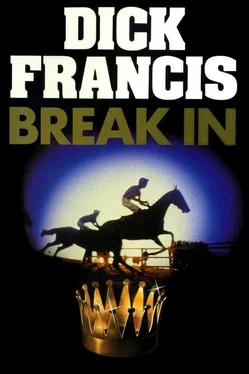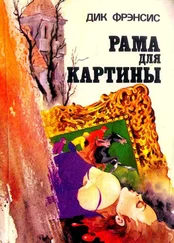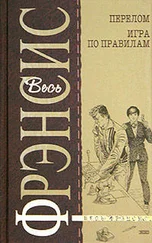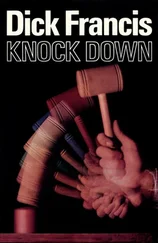‘My daughter,’ he said, nodding, as he saw I’d been looking. ‘She lives here part of the time, part with her mother.’ He shrugged. ‘One of those things.’
‘I’m sorry.’
‘Yes. Well, it happens. Coffee?’ He poured into two small cups and handed me one. ‘Sugar? No, I suppose not. Sit down. Here’s the brandy.’
He was neat in movement as in dress, and I found myself thinking ‘dapper’; but there was purposefulness there under the surface, the developed faculty of getting things done. I sat in one of the armchairs with coffee and brandy beside me, and he sat also, and sipped, and looked at me over his cup.
‘You were in luck,’ he said finally. ‘I put out a few feelers this morning and was told a certain person might be lunching at his club.’ He paused. ‘I was sufficiently interested in your problem to arrange for a friend of mine to meet and sound out that person, whom he knows well, and their conversation was, one might say, fruitful. As a result I myself went to a certain person’s office this afternoon, and the upshot of that meeting was some information which I’ll presently show you.’
His care over the choice of words was typical, I supposed, of the stratosphere of the civil service: the wheeler-dealers in subtlety, obliqueness and not saying quite what one meant. I never discovered the exact identity of the certain person, on the basis no doubt that it wasn’t something I needed to know, and in view of what he’d allowed me a sight of, I could scarcely complain.
‘I have some letters,’ Eric Olderjohn said. ‘More precisely, photocopies of letters. You can read them, but I am directly commanded not to let you take them away. I have to return them on Monday. Is all that... er... quite dear?’
‘Yes.’ I said.
‘Good.’
Without haste he finished his coffee and put down the cup. Then, raising the skirt of the table which bore the trays, he bent and brought out a brown leather attaché case, which he rested on his knees. He snapped open the locks, raised the lid and paused again.
‘They’re interesting,’ he said, frowning.
I waited.
As if coming to a decision which until that moment he had left open, he drew a single sheet of paper out of the case and passed it across.
The letter had been addressed to the Prime Minister and had been sent in September from a company which made fine china for export. The chairman, who had written the letter, explained that he and the other directors were unanimous in suggesting some signal honour for Mr Maynard Allardeck, in recognition of his great and patriotic services to industry.
Mr Allardeck had come generously to the aid of the historic company, and thanks entirely to his efforts the jobs of two hundred and fifty people had been saved. The skills of many of these people were priceless and included the ability to paint and gild porcelain to the world’s highest standards. The company was now exporting more than before and was looking forward to the brightest of futures.
The board would like to propose a knighthood for Mr Allardeck.
I finished reading and looked over at Eric Olderjohn.
‘Is this sort of letter normal?’ I asked.
‘Entirely.’ He nodded. ‘Most awards are the result of recommendations to the Prime Minister’s office. Anyone can suggest anyone for anything. If the cause seems just, an award is given. The patronage people draw up a list of awards they deem suitable, and the list is passed to the Prime Minister for approval.’
I said, ‘So all these people in the honours lists who get medals... firefighters, music teachers, postmen, people like that, it’s because their mates have written in to suggest it?’
‘Er, yes. More often their employers, but sometimes their mates.’
He produced a second letter from his briefcase and handed it over. This one also was from an exporting company and stressed Maynard’s invaluable contributions to worthwhile industry, chief among them the saving of very many jobs in an area of great local unemployment.
It was impossible to overestimate Mr Allardeck’s services to his country in industry, and the firm unreservedly recommended that he should be offered a knighthood.
‘Naturally,’ I said, ‘the patronage people checked that all this was true?’
‘Naturally,’ Eric Olderjohn said.
‘And of course it was?’
‘I am assured so. The certain person with whom I talked this afternoon told me that occasionally, if they receive six or seven similar letters all proposing someone unknown to the general public, they may begin to suspect that the person is busily proposing himself by persuading his friends to write in. The writers of the two letters I’ve shown you were specifically asked, as their recommendations were so similar, if Maynard himself had suggested they write. Each of them emphatically denied any such thing.’
‘Mm,’ I said. ‘Well they would, wouldn’t they, if they stood to gain from Maynard for his knighthood.’
‘That’s a thoroughly scurrilous remark.’
‘So it is,’ I said cheerfully. ‘And your certain person, did he put Maynard down for his Sir?’
He nodded. ‘Provisionally. To be considered. Then they received a third letter, emphasising substantial philanthropy that they already knew about, and the question mark was erased. Maynard Allardeck was definitely in line for his K. The letter inviting him to accept the honour was drafted, and would have been sent out in about ten days from now, at the normal time for the New Year’s list.’
‘Would have been?’ I said.
‘Would have been.’ He smiled twistedly. ‘It is not now considered appropriate, as a result of the stories in the Daily Flag and the opinion page in the Towncrier.’
‘Rose Quince,’ I said.
He looked uncomprehending.
‘She wrote the piece in the Towncrier,’ I said.
‘Oh... yes.’
‘Would your, er, certain person,’ I asked, ‘really take notice of those bits in the newspapers?’
‘Oh, definitely. Particularly as in each case the paragraphs were delivered by hand to his office, outlined in red.’
‘They weren’t!’
Eric Olderjohn raised an eyebrow. ‘That means something to you?’ he asked.
I explained about the tradespeople and the owners all receiving similarly marked copies.
‘There you are, then. A thorough job of demolition. Nothing left to chance.’
‘You mentioned a third letter,’ I said. ‘The clincher.’
He peered carefully into his case and produced it. ‘This one may surprise you,’ he said.
The third letter was not from a commercial firm but from a charitable organisation with a list of patrons that stretched half the way down the left side of the page. The recipients of the charity appeared to be the needy dependants of dead or disabled public servants. Widows, children, the old and the sick.
‘How do you define a public servant?’ I asked.
‘The Civil Service, from the top down.’
Maynard Allardeck, the letter reported, had worked tirelessly over several years to improve the individual lives of those left in dire straits through no fault of their own. He unstintingly poured out his own fortune in aid, besides giving his time and extending a high level of compassionate ongoing care to families in need. The charitable organisation said it would itself feel honoured if the reward of a knighthood should be given to one of its most stalwart pillars: to the man they had unanimously chosen to be their next chairman, the appointment to be effective from 1 December of that year.
The letter had been signed by no fewer than four of the charity’s officers: the retiring chairman, the head of the board of management, and two of the senior patrons. It was the fourth of these signatures which had me lifting my head in astonishment.
Читать дальше




